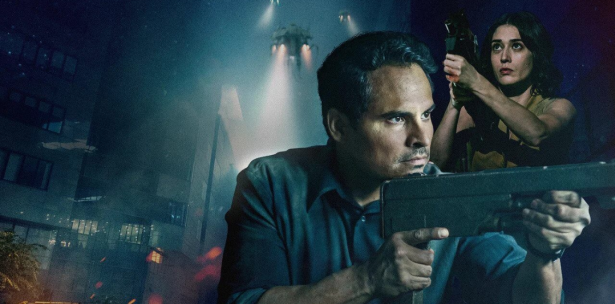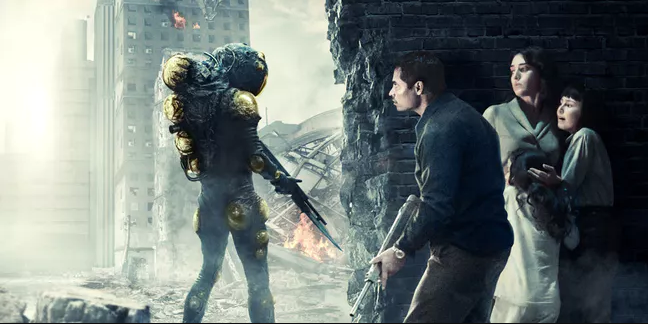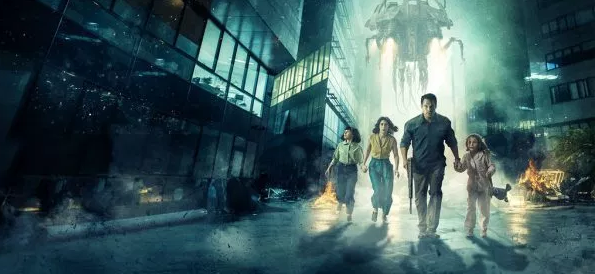Directed by Ben Young, Extinction (2018), is a sci-fi thriller that seemingly came out of nowhere – a film that this reviewer was surprised to see (for a variety of reasons) in the “New Releases” catalog over the weekend (released on July 27) on Netflix. Having what appears to be a respectable, big Hollywood style budget in play, the film’s screenplay (originally written by Spenser Cohen) has been around since 2013. The film in was presumed to be a homerun in its inception – with talks of James McAvoy to star and with Joe Johnston (Jumanji, Captain America: The First Avenger) to direct. After an array of changes befuddled the Universal Pictures property and a new star was selected (McAvoy is now scheduled to be in the much-talked about film, Glass, which is to come out next year), the rights were in turn acquired by Netflix, to beef up their Original Film catalog and to play major league ball with the best Hollywood has to offer.
While the changing of directorial hands as well as distribution rights were interesting enough, the most intriguing aspect to the product that is Extinction lands on the lead actor chosen to play Peter – the main character of the film and on-screen husband to Lizzy Caplan’s character, Alice. Announced in January of 2017, prior to the start of production, Michael Peña (known for his roles in Marvel’s Ant-Man series, as well as 12 Strong and End of Watch) was selected to star in the film as essentially an action star. This seemed like a very unorthodox, yet respectable choice for Director Ben Young, who had to be familiar with Michael Peña’s long history of being type-casted; not only is the accomplished actor a recurring choice for Latin roles, but he has established a serious foothold in Hollywood as the comedic relief in just about everything he is involved in. Extinction manages to be a serious departure for Peña, and a legitimate opportunity for him to break from the mold of this stereotype he has found himself in within Hollywood cinema. The question being – does Peña manage to rise to the occasion, and does the film allow him to be more than the type-casted performer he is recognized as?

TABLE SETTING / FIRST-ACT (semi-spoilers)
Peter (Peña) is a father of two, and is a busy, blue-collar engineer attempting to juggle family life with work. Wiring cables and fixing things during late-nights at a nearby factory, Peter is a handy-man, and approaches everything in a robotically, analytical way. The early moments of Extinction encompass aerial shots of futuristic urbanites, shot in slow-motion as they move to-and-fro throughout the somewhat futuristic city that could be in the not-so-distant future. To dramatically break up these slow-motion capture moments Peter finds himself in, cataclysmic, extraterrestrial attacks begin to consume his life in the form of recurring nightmares, causing his wife Alice (played by Showtime’s Master of Sex star Lizzy Caplan) to urge her husband to consult a professional with the ability to tamper with memories. When the experiences provoke more dream-invading episodes, Peter is led to believe there is something to his self-assumed “premonitions,” and bails on the appointment, causing more trouble and feelings of emotional neglect for his wife and children at home.
Most of Extinction’s first act is driven by this dynamic, as we continue to question if this “alien invasion” is on the horizon or just a psychological paranoia in Peter’s mind. Our questions are answered just when the ambiguity is reaching its narrative limit, and the sky soon erupts into a full-fledged invasion at the tail-end of a house party in celebration of Alice’s work promotion. Explosions and violence engulf the city as heavy, machine-operated spaceships swarm the urban center and begin firing upon the mostly-defenseless citizens that reside there. Peter is thrown into survival mode to protect his family as the foreign invaders close in on the skyscrapers and the city center, systematically killing its inhabitants left and right.

DIRECTION, DISSECTION & VERDICT
As the family attempt to barricade themselves within their apartment in one of the more rewarding and nerve-racking sequences of the film, Extinction continues to barrel at a steady pace, winding in a suitably, strong narrative fashion that keeps you wondering throughout its entirety. The movie particularly picks up steam when the events transition from the high-rise they are held up in, as they attempt to navigate the now war-torn city they find themselves in. Extinction refuses to place all its cards on the table until more than halfway through the film, when it suddenly manages to walk a tight-rope between quality cinematic writing and potentially convoluted storytelling. When the twist is revealed, the film manages to stay true to its purpose, driving forward with action, suspense, and maybe only a couple questions left unanswered due to its speedy exposition in an attempt to keep in pace with its own momentum.
To be true, Extinction’s largest complications regrettably land on the lead – particularly as his role (as well as those who play his family members) expands due to the complexity of the big twist and reveal later in the film. While I must admit, I appreciate Michael Peña as the competent and talented performer that he is on the big screen; he is entertaining in respectable doses and predominantly brings with him a sense of comfortability and masterful comedic timing to most of the work he is involved in (a strong emphasis placed on 2015’s Ant-Man). Unfortunately, I have yet to be convinced Peña has the depth that is necessary to perform outside of a supporting role. He seems to be far more of a versatile threat in (dare I say) the comedic roles the audience has grown accustomed to see him perform in. While he may have been a welcomed recast in this year’s Ant-Man and the Wasp for most audiences, I found that the more screen time he held, the more it negatively impacted his overall performance.

In Extinction, the best moments land on the performances of Peña’s accompanied co-star Caplan and the young performers cast as their children (Amelia Crouch and Erica Tremblay). Peter’s boss David (played by Netflix’s own Luke Cage star Mike Colter) is also a welcomed addition; however, Colter isn’t given enough to do in the film, and is mostly used as another messenger of narrative exposition, as the film attempts to stay on the rails to remedy and welcome the pivoting plot it introduces halfway through its 95-minute runtime. While the film leaves a window for a potential sequel later down the road, my feelings stand mixed on the star and Peña’s potential future involvement. While there is no guarantee of a sequel, Extinction is still very much worth watching; the twist allows for a more refined complexity that adds to its overall quality and becomes evocative of a particularly popular show produced by HBO created by Jonathan Nolan and Lisa Joy (hint-hint).
While I can’t fault Michael Peña’s attempt to transition from supporting role to lead indefinitely, I can’t help but admit he is most triumphant in small doses and in a comedic capacity. Extinction is nearly void of humor; this is no surprise due to its quick pacing and suitably complex storytelling. However, with Peña’s performance, not much is left without his comedic contributions. In truth, not everyone is meant to be the lead or even an action star for that matter. While it manages to somewhat work for Peña in Extinction, the result still seems lacking by the end of the film. With That being said – if Netflix believes they have a gem on their hands and have seen signs of Netflix Original Film success, who knows? Maybe we will see a sequel down the road with the cast fully reprised (a task that may prove to be a challenge for the younger actresses due to the narrative). If so, I can only hope a little more can be brought to the table in the lead’s performance when push comes to shove. Maybe a little humor, perhaps?
Extinction (2018) is currently streaming on Netflix.

